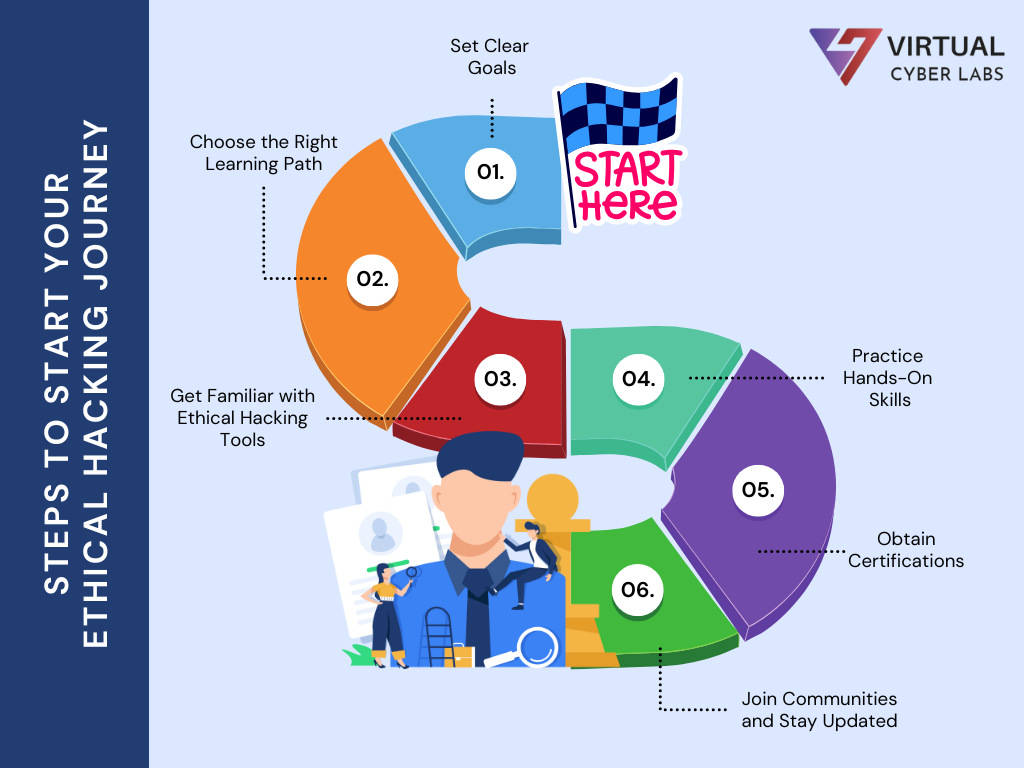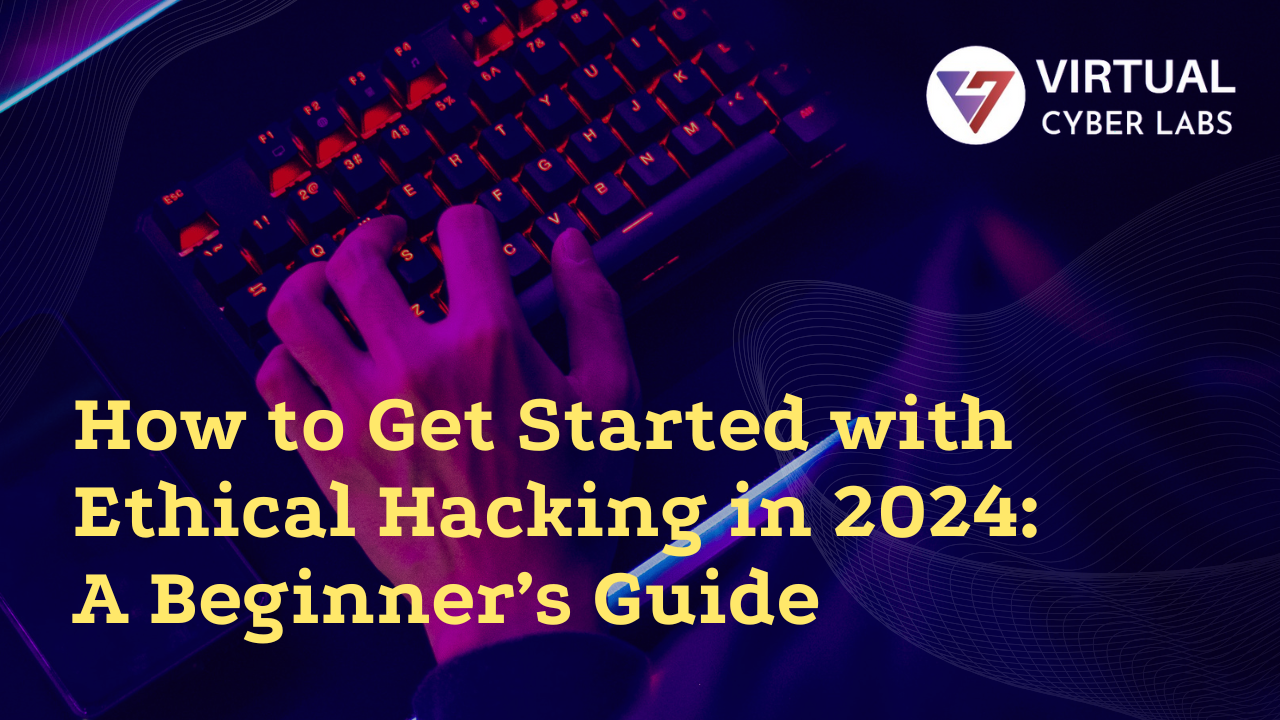How to Get Started with Ethical Hacking in 2024: A Beginner’s Guide
In today’s digital age, where cyber threats are constantly evolving, ethical hacking has emerged as a crucial field to safeguard organizations and individuals from malicious attacks. Ethical hackers, also known as white-hat hackers, use their skills to identify and fix vulnerabilities in systems, networks, and applications before malicious hackers can exploit them. If you’re fascinated by cybersecurity and want to dive into ethical hacking, this guide will help you get started.
Understanding Ethical Hacking
Ethical hacking involves using hacking techniques for legitimate purposes, such as enhancing security and protecting sensitive information. Ethical hackers follow a strict code of conduct and always operate with permission from the system owner. Unlike black-hat hackers who exploit weaknesses for personal gain, ethical hackers aim to prevent breaches and ensure data integrity.
Key roles of ethical hackers include:
- Conducting penetration testing
- Assessing system vulnerabilities
- Reporting and fixing security flaws
- Ensuring compliance with cybersecurity regulations
Prerequisites for Becoming an Ethical Hacker
While anyone can learn ethical hacking, having a foundational knowledge of certain topics will give you a significant head start. Here are the essential prerequisites:
- Basic Networking Concepts
- Learn about IP addresses, DNS, firewalls, and routing.
- Understand protocols like HTTP, HTTPS, FTP, and SSH.
- Operating Systems
- Familiarize yourself with Linux distributions such as Kali Linux, which is widely used in penetration testing.
- Learn Windows server management and its vulnerabilities.
- Programming Basics
- Understand scripting languages like Python, Bash, or Ruby.
- Gain familiarity with web programming languages like HTML, JavaScript, and PHP.
- Cybersecurity Basics
- Learn about cryptography, malware analysis, and secure coding practices.
- Understand how common attacks like phishing, SQL injection, and XSS work.
Steps to Start Your Ethical Hacking Journey

1. Set Clear Goals
Determine why you want to learn ethical hacking. Are you pursuing a career in cybersecurity, or do you have a personal interest in safeguarding systems? Clear goals will keep you motivated throughout the learning process.
2. Choose the Right Learning Path
There are numerous free and paid resources available to learn ethical hacking. Some popular platforms include:
- Online Courses: Platforms like Youtube, Udemy, and Coursera offer structured courses on ethical hacking and penetration testing.
- Books: “The Web Application Hacker’s Handbook” and “Hacking: The Art of Exploitation” are excellent resources for beginners.
- Websites: Explore forums like Hack The Box and TryHackMe to practice hands-on skills.
3. Get Familiar with Ethical Hacking Tools
Ethical hackers rely on a variety of tools to perform vulnerability assessments and penetration tests. Start by learning these widely-used tools:
- Kali Linux: A Linux distribution specifically designed for penetration testing.
- Nmap: A network scanning tool to identify open ports and services.
- Metasploit: A framework for exploiting vulnerabilities.
- Wireshark: A network protocol analyzer for capturing and inspecting network traffic.
4. Practice Hands-On Skills
Practical experience is essential in ethical hacking. Practice your skills in controlled environments, such as:
- Virtual Labs: Platforms like Virtual Cyber Labs, Hack The Box, and TryHackMe simulate real-world hacking scenarios.
- Capture The Flag (CTF) Challenges: Participate in CTF competitions to test and refine your hacking skills.
5. Obtain Certifications
Certifications validate your expertise and make you stand out to employers. Popular certifications for ethical hackers include:
- Certified Ethical Hacker (CEH): Focuses on tools and techniques used in ethical hacking.
- Offensive Security Certified Professional (OSCP): Emphasizes hands-on penetration testing.
- CompTIA Security+: Covers a broad range of cybersecurity topics.
6. Join Communities and Stay Updated
The cybersecurity landscape is constantly evolving. Stay updated by:
- Joining forums and groups like Reddit’s r/cybersecurity and DEF CON groups.
- Following cybersecurity blogs and attending industry conferences.
Ethical Hacking: Legal and Ethical Boundaries
Ethical hacking comes with great responsibility. Always adhere to the following guidelines:
- Obtain proper authorization before testing a system.
- Avoid causing any damage to the systems you test.
- Respect user privacy and confidentiality.
Engaging in unauthorized hacking can lead to severe legal consequences, even if your intentions are good. Always work within the legal framework and maintain professional integrity.
Career Opportunities in Ethical Hacking
Ethical hacking opens the door to various career opportunities in cybersecurity. Roles you can pursue include:
- Penetration Tester
- Security Analyst
- Security Consultant
- Vulnerability Assessment Specialist
- Incident Responder
The demand for ethical hackers is growing rapidly, with organizations across the globe seeking skilled professionals to secure their digital assets.
Final Thoughts
Ethical hacking is not just a skill but a responsibility to protect and defend in a digital-first world. By continuously learning, practicing, and staying updated with the latest trends, you can build a successful career in this exciting field. Start your journey today and become a guardian of the digital realm.







